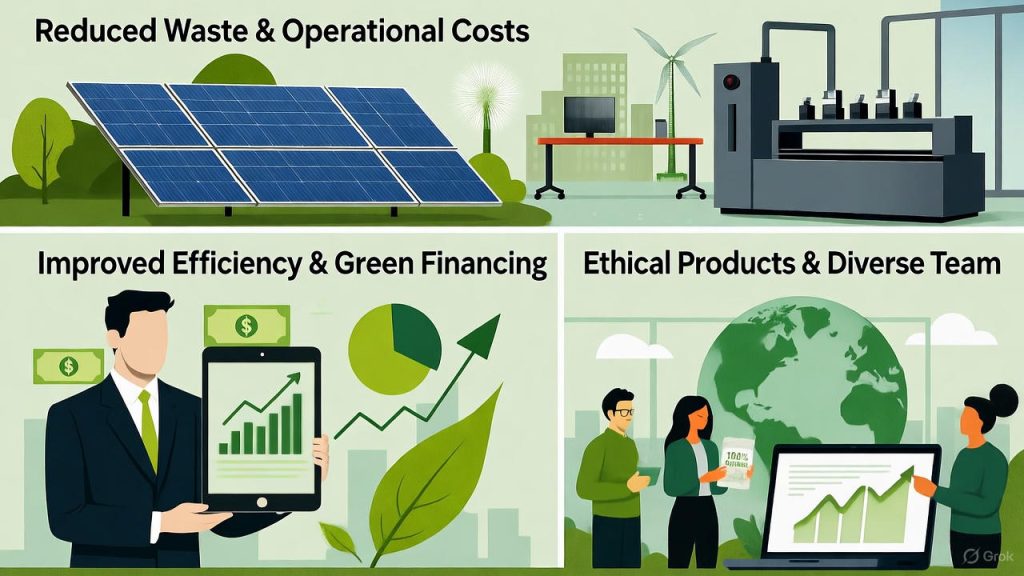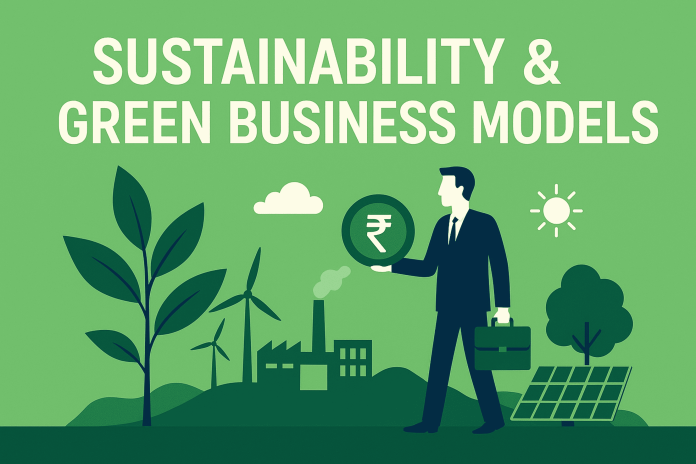In India’s fast-changing economic landscape, Sustainability & Green Business Models have evolved from a corporate trend into a national priority. As industries expand and natural resources shrink, Indian businesses are realizing that growth must go hand in hand with environmental responsibility. Across sectors—energy, agriculture, manufacturing, and technology—companies are adopting Sustainability & Green Business Models to ensure long-term profitability, ethical progress, and environmental conservation.
Introduction to Sustainability & Green Business Models
Sustainability and green business models focus on finding a balance between profit and the planet. These approaches combine environmental and social responsibility with business goals, ensuring that today’s progress does not harm the needs of future generations. In India, this movement has gained strong momentum due to climate awareness, government support, and rising demand for ethical products.
Today, many companies view sustainability as a smart economic strategy rather than just a moral choice. It helps reduce waste, cut costs, improve efficiency, and attract green investments. As a result, businesses across India — from major corporations to small startups — are embracing cleaner, smarter, and more responsible ways of operating.

Government Policies Supporting Sustainability & Green Business Models
The Indian government has played a vital role in promoting Sustainability & Green Business Models across industries. Through initiatives such as the National Action Plan on Climate Change (NAPCC) and the National Solar Mission, it encourages companies to adopt renewable energy, sustainable business strategies, and eco-friendly technologies that support long-term environmental goals.
Through initiatives like Swachh Bharat Abhiyan, Green Credit Programme, and Perform, Achieve and Trade (PAT) scheme, India is aligning its economic development with environmental goals. These programs ensure that Sustainability & Green Business Models receive both policy support and financial incentives.
Furthermore, schemes like FAME India for electric mobility and Production Linked Incentives (PLI) for clean technology manufacturing have made sustainability central to India’s growth story.
Corporate India Embracing Sustainability & Green Business Models
Across India’s corporate sector, companies are embedding Sustainability & Green Business Models into their organizational DNA. Tata, ITC, Mahindra, and Infosys are leading examples. Tata Power is expanding renewable energy generation, ITC practices a “Triple Bottom Line” approach, and Mahindra & Mahindra has achieved carbon neutrality milestones.
These companies show that Sustainability & Green Business Models are not barriers to profit but pathways to resilience. By cutting emissions, conserving resources, and engaging in fair trade, businesses enhance their brand reputation and attract sustainability-conscious consumers. Corporate social responsibility (CSR) is no longer a checkbox—it’s now the core of India’s business identity shaped by Sustainability & Green Business Models.
Startups Redefining Entrepreneurship Through Sustainability & Green Business Models
India’s booming startup ecosystem is at the forefront of innovation in Sustainability & Green Business Models. Startups like ReNew Power, Ather Energy, ZunRoof, and Phool.co are transforming industries by merging technology with sustainability.
From renewable energy to recycling, these ventures prove that Sustainability & Green Business Models can create jobs while protecting nature. Phool.co, for example, upcycles temple flower waste into incense and bio-leather, turning pollution into profit. Banyan Nation uses data-driven recycling to manage plastic waste efficiently. These innovators represent a new era where Sustainability & Green Business Models drive India’s entrepreneurial success.
Renewable Energy: The Core of Sustainability & Green Business Models
Renewable energy forms the foundation of Sustainability & Green Business Models. India’s renewable sector—solar, wind, hydro, and biomass—is growing rapidly, with the nation targeting 500 GW of renewable capacity by 2030. Companies such as Adani Green Energy, Tata Power Renewable, and ReNew Power are leading this transformation.
Floating solar projects, like the ones proposed for Wular Lake in Kashmir, symbolize the innovative spirit behind Sustainability & Green Business Models. These initiatives not only reduce carbon emissions but also provide local employment and energy security. As the demand for green energy increases, renewable solutions are becoming synonymous with sustainable profitability.

Agriculture and Rural Development Through Sustainability & Green Business Models
Agriculture remains the heart of India’s economy, and Sustainability & Green Business Models are revitalizing rural livelihoods. Programs like Paramparagat Krishi Vikas Yojana promote organic farming and natural fertilizers, reducing chemical use and improving soil health.
Startups such as Kheyti, AgroStar, and Stellapps use technology to create smarter farming systems. Their work exemplifies how Sustainability & Green Business Models can uplift rural India by balancing productivity and environmental protection. These approaches also align with global efforts toward food security and sustainable resource use.

Sustainable Infrastructure and Urban Planning
Urbanization is accelerating in India, and cities are adopting Sustainability & Green Business Models to reduce pollution and improve livability. The Smart Cities Mission focuses on sustainable infrastructure, renewable energy, and waste management. Real estate developers like Godrej Properties and DLF are designing green-certified buildings that minimize energy consumption and encourage eco-friendly lifestyles.
These sustainable urban initiatives demonstrate how Sustainability & Green Business Models can create future-ready cities. Green construction practices, energy-efficient lighting, and rainwater harvesting have become standard features in India’s new urban design paradigm.
Circular Economy and Waste Management
A cornerstone of Sustainability & Green Business Models is the circular economy—an approach that minimizes waste by reusing and recycling resources. India generates millions of tons of waste every year, but circular businesses like Saahas Zero Waste, Eco Eclectic Technologies, and GEM Enviro Management are turning trash into treasure.
By embracing recycling, upcycling, and resource recovery, these companies illustrate how Sustainability & Green Business Models can simultaneously protect the planet and generate profits. A circular economy reduces dependence on virgin materials and builds a culture of conscious consumption.

Green Financing Fuelling Sustainable Growth
Green financing plays a crucial role in scaling Sustainability & Green Business Models. The rise of green bonds, ESG investments, and impact funds provides essential capital for sustainable ventures. India ranks among Asia’s top issuers of green bonds, funding renewable energy, infrastructure, and sustainable housing.
Financial institutions like SBI and HDFC Bank are integrating environmental criteria into lending policies, ensuring that projects align with Sustainability & Green Business Models. The Securities and Exchange Board of India (SEBI) has also mandated ESG disclosures, encouraging greater accountability and transparency across the corporate sector.
Consumer Awareness and Lifestyle Shifts
Modern Indian consumers are actively supporting Sustainability & Green Business Models. With awareness of climate change rising, people now prefer eco-friendly products, plastic-free packaging, and sustainable brands.
Companies like FabIndia, Forest Essentials, and Bare Necessities have aligned their identities with Sustainability & Green Business Models, focusing on ethical sourcing and minimal waste. This consumer-driven demand is forcing other industries—fashion, FMCG, and retail—to follow suit. The youth, especially, are turning sustainability from a buzzword into a daily practice.
Technology Empowering Sustainability & Green Business Models
Technology is accelerating the implementation of Sustainability & Green Business Models in India. Artificial Intelligence (AI), the Internet of Things (IoT), and blockchain help optimize supply chains, monitor emissions, and ensure resource transparency.
AI-driven analytics can identify inefficiencies, IoT devices track energy use, and blockchain verifies sustainable sourcing. These tools are making Sustainability & Green Business Models more measurable, efficient, and scalable. With the rise of digital innovation, Indian businesses can now achieve sustainability goals faster and more accurately than ever.

Education and Skill Development for a Green Future
India’s transition to Sustainability & Green Business Models depends on education and skill-building. Institutions like TERI School of Advanced Studies, IIT Delhi, and IIM Ahmedabad offer specialized programs in environmental management and green entrepreneurship.
Moreover, skill development programs across rural India train youth in renewable energy installation, organic farming, and waste management. This workforce development ensures that Sustainability & Green Business Models are not limited to corporate India but reach grassroots communities as well.
Challenges Facing Sustainability & Green Business Models
Despite progress, adopting Sustainability & Green Business Models faces challenges such as high initial costs, lack of awareness, and regulatory hurdles. Small and medium enterprises often struggle to access green technologies or financing.
However, these challenges are temporary. With growing government support and consumer awareness, Sustainability & Green Business Models are becoming more accessible and economically viable. In the long term, the benefits—resource efficiency, job creation, and brand loyalty—far outweigh the costs.
The Road Ahead for Sustainability & Green Business Models in India
India’s commitment to achieving Net Zero by 2070 offers a roadmap for integrating Sustainability & Green Business Models across sectors. Future growth will rely on collaboration between the public and private sectors, academia, and civil society.
From renewable power plants to eco-tourism initiatives, every new project must embody the principles of Sustainability & Green Business Models. With green financing, technology, and innovation working together, India is well-positioned to become a global leader in sustainable development.
Conclusion
Sustainability & Green Business Models represent India’s pathway to inclusive and responsible growth. They are not merely environmental ideals but essential business strategies that guarantee long-term resilience. As industries, startups, and consumers align around sustainability, India’s economy is being reshaped into one that values both profit and the planet.
The future belongs to enterprises that understand that sustainability is strength. With strong policy backing, technological innovation, and social awareness, Sustainability & Green Business Models will define India’s progress—creating a future that is green, inclusive, and globally admired.
FAQs on Sustainability & Green Business Models
1. What are Sustainability & Green Business Models?
Sustainability & Green Business Models refer to business strategies designed to balance profitability with environmental protection. In India, Sustainability & Green Business Models focus on renewable energy, waste reduction, eco-friendly manufacturing, and long-term social benefits.
2. Why are Sustainability & Green Business Models important for Indian businesses?
Sustainability & Green Business Models are vital for Indian companies because they help reduce pollution, save resources, and improve brand reputation. Many Indian enterprises now rely on Sustainability & Green Business Models to meet global environmental standards.
3. How do Sustainability & Green Business Models impact profitability?
Businesses adopting Sustainability & Green Business Models often experience reduced operational costs due to energy efficiency and better waste management. Over time, Sustainability & Green Business Models increase both profit and brand trust.
4. Which industries in India benefit most from Sustainability & Green Business Models?
Industries like energy, textiles, FMCG, automobiles, and IT are rapidly embracing Sustainability & Green Business Models. These sectors are integrating green technologies and sustainable operations into their business core.
5. How are startups contributing to Sustainability & Green Business Models in India?
Indian startups are innovating new products that align with Sustainability & Green Business Models—ranging from eco-packaging to renewable energy. Their contributions make Sustainability & Green Business Models practical for modern, tech-driven economies.
6. What government policies support Sustainability & Green Business Models in India?
The Indian government promotes Sustainability & Green Business Models through programs like the National Solar Mission, FAME India for electric mobility, and EPR regulations for waste management. These policies make Sustainability & Green Business Models easier to implement nationwide.
7. Can small businesses adopt Sustainability & Green Business Models effectively?
Yes, even small enterprises can adopt Sustainability & Green Business Models by optimizing resources, using solar energy, and minimizing waste. Localized Sustainability & Green Business Models ensure long-term stability for small-scale operations.
8. What are the main challenges in implementing Sustainability & Green Business Models?
The primary challenges include lack of awareness, high initial costs, and weak infrastructure. However, as awareness grows, Sustainability & Green Business Models are becoming more feasible across sectors.
9. How do Sustainability & Green Business Models help achieve India’s Net Zero goal?
Sustainability & Green Business Models contribute directly to India’s Net Zero 2070 goal by reducing carbon emissions and encouraging renewable energy use. Through Sustainability & Green Business Models, industries can play a crucial role in climate action.
10. What is the future of Sustainability & Green Business Models in India?
The future of Sustainability & Green Business Models in India is bright. As global investors support eco-conscious ventures, Indian businesses adopting Sustainability & Green Business Models will lead the way toward a greener economy.



